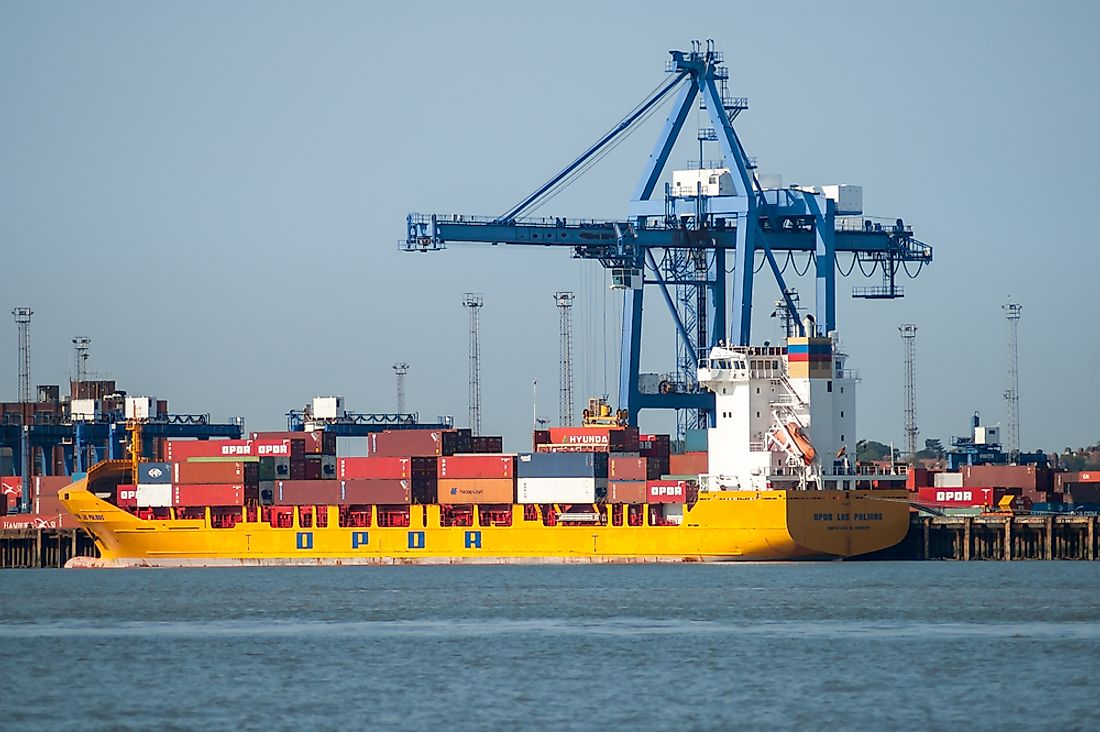The Busiest Cargo Ports in the United Kingdom

According to the ECI (Economic Complexity Index), the United Kingdom ranks as the 10th largest exporter in the world and the ninth most complex economy. The United Kingdom recorded $34.5 billion in the value of exports compared to $55.2 billion in the value of imports. This means that the UK is a net importer. To facilitate trade, the UK relies on its busiest cargo ports located strategically along the country’s coastline.
Busiest Ports in the UK
Grimsby and Immingham
The seaport of Immingham is located on the east coast near the town of Immingham and on the south bank of Humber estuary near Grimsby. It is the busiest cargo port in the United Kingdom with a cargo volume of 59 million tons being loaded and discharged here. The port was initially built as a terminal for exporting coal in 1906. The Immingham port was later expanded with the introduction of deeper docks and increase in the variety of cargo. Today, the port serves as the main terminal for the importation of oil through the Immingham Oil terminal. Iron ore and coal are also traded through their dedicated terminals.
London
The port of London was once the largest port in the world. Currently, it is the second largest port in the UK with a cargo volume of 45 million tons. The port facilities are located along River Thames and stretch from the capital to the North Sea. The seaport is managed by the Port of London Authority which has overseen its increment and construction since 1908. Various vessels such as roll-on-roll-off ferries and cruise liners are handled in the port. The port of London also receives a variety of cargo from various parts of the world.
Tees and Hartlepool
The ports of Tees and Hartlepool are located about 10 kilometers from each other. They are found on Tees River in the Northeastern part of England. The ports are vital terminals for the nearby petroleum fields on the North Sea. The town of Hartlepool is an important producer of industrial chemicals which are shipped using the Tees port. As the third largest port in the UK, Tees, and Hartlepool handle 33 million tons of cargo.
Liverpool/Mersey-side
The port of Liverpool has a dock system that stretches for 12.1 kilometers from Brunswick to Seaforth. Historically, the dock at port Liverpool was the pioneer of enclosed commercial docks and was initially built in 1715. Over the centuries, several docks were added and interconnected using lock gates. These became interconnected docks that allowed the movement of vessels within the dock system in 24 hours. The port of Liverpool handles freight such as grain, timber, bulk liquids, oil, and general cargo. It is the 4th largest port in the UK with a cargo volume of 32 million tons.
Felixstowe
The port of Felixstowe is located in Suffolk. It the busiest container port in the UK controlling more than 42% of UK’s containerized trade. It is also the 6th busiest in Europe and was ranked 35th worldwide. The port handles about 26 million tons of cargo.
Other UK Ports
With over 120 commercial seaports, the United Kingdom depends on the busiest ports to steer seaborne trade. Other busy ports include Forth ports and Belfast, each handling more than 25 million and 15 million tons respectively.
The Busiest Cargo Ports in the United Kingdom
| Rank | Port | Total Cargo Volume (Tons, 000s) |
|---|---|---|
| 1 | Grimsby and Immingham | 59,103 |
| 2 | London | 45,430 |
| 3 | Tees and Hartlepool | 33,947 |
| 4 | Liverpool/Mersey-side | 32,935 |
| 5 | Felixstowe | 26,269 |
| 6 | Forth Ports | 25,332 |
| 7 | Belfast | 15,186 |











